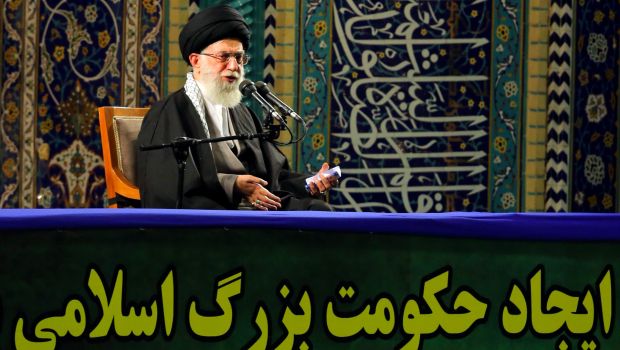
A handout picture released by the official website of Iran’s supreme leader, Ayatollah Ali Khamenei, shows him delivering a speech during a gathering of Basij in Tehran on November 20, 2013. (AFP PHOTO/KHAMENEI.IR)
London, Asharq Al-Awsat—Iranian Supreme Leader Ali Khamenei said on Wednesday that his country would not give up its “right” to nuclear technology as negotiations with six world powers got underway in Geneva.
Khamenei made the remarks to a gathering of 50,000 Basij militiamen in Tehran in a rare live televised address, only a few hours before the nuclear talks were due to start.
The Iranian leader said that in the nuclear talks between Iran and the group of states known as the P5+1—the five permanent members of the UN Security Council and Germany—Iran had some “red lines” that should be respected.
“I do not intend to intervene in the details of negotiations,” Khamenei said. “I insist that all the rights of the Iranian people, including nuclear rights, should be taken into consideration.”
After recounting a long list of what he said were historic American and Western crimes and present efforts to gain hegemony in the Middle East, Khamenei said: “We want to have friendly relations with all nations, even the United States. We are not hostile to the American nation. They are like other nations in the world.”
In response, the militiamen chanted “Death to America,” repeating one of the main rallying cries of hardline supporters of the Islamic Republic.
Iranian President Hassan Rouhani made statements similar to those of the supreme leader in a phone call to British Prime Minister David Cameron on Tuesday, the first such contact between British and Iranian leaders in a decade.
“Iran is determined that its nuclear activities will remain peaceful. It will strongly defend its nuclear rights,” the official IRNA news agency reported Rouhani as telling Cameron.
The British prime minister’s office said on Tuesday that both leaders agreed it was “important to seize the opportunity” presented by the nuclear talks.
The election of moderate Hassan Rouhani as Iran’s president earlier this year has raised hopes for an end to the standoff over Tehran’s nuclear program after a decade of failed initiatives and rising tensions.
Instead of a halt to all uranium enrichment, as mentioned in many UN Security Council resolutions, the world powers now appear to be seeking a suspension of enrichment to medium levels in Iranian territory, leading some to speculate that this may be the “red line” spoken of by Khamenei.
Meanwhile, Iran’s foreign minister expressed optimism about the prospects of reaching a deal in Geneva, 10 days after a previous attempt to reach an agreement failed. “I think there is every possibility for success,” said Mohammad Javad Zarif, who also posted a conciliatory but defiant video message on YouTube on Tuesday.
In the five-minute foreign ministry-produced video, Zarif said that the path to a resolution of the dispute over Iran’s nuclear program is open and world powers should seize the “historic opportunity” to clinch a deal.
Representatives of the P5+1 reconvened with their Iranian counterparts on Wednesday in Geneva for talks on the program.
Russian Foreign Minister Sergey Lavrov said in remarks broadcast on Saturday that chances of reaching an agreement were very good and the opportunity should not be passed up.
He has also suggested Iran is prepared to produce less enriched uranium and halt enrichment to 20 percent, which is a relatively simple technical step away from weapons-grade material—two of the steps Western powers want Iran to take.
Iranian news agency IRNA said Rouhani also spoke by telephone with Chinese President Xi Jinping, telling him Tehran was seeking “an accord that preserves its rights and shows that the Iranian nuclear program is totally peaceful.”
He called for China to oppose “excessive demands of certain countries,” likely a reference to France, which took a tough stance at the last round of talks in Geneva at the start of November.
In the US, President Barack Obama, fresh from seeking to dissuade lawmakers from imposing new sanctions on Iran, was more cautious, saying, “I don’t know if we will be able to close a deal this week or next week,” at a forum hosted by the Wall Street Journal.
The developments follow a deadly double suicide bombing at Iran’s embassy in Lebanon. At least 22 people were killed and more than 140 injured in the attack in Beirut.
The Iranian cultural attaché, Sheikh Ibrahim Ansari, and five other Iranian citizens are among the dead, according to the Fars news agency.
The jihadist group known as the Abdullah Azzam Brigades, which is affiliated to Al-Qaeda, has claimed responsibility for the attack.
